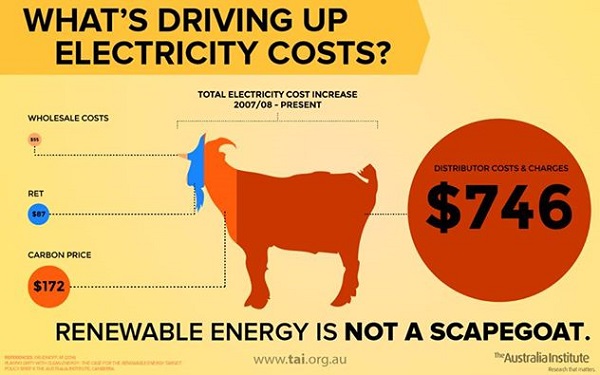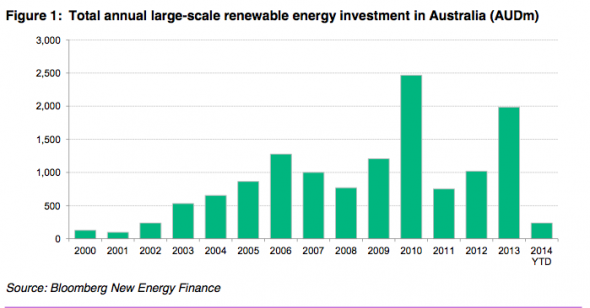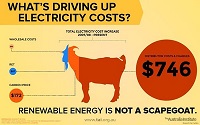The Renewable Energy target (RET) has been severely scapegoated on electricity prices according to The Australia Institute Facebook:

The Tea Party LNP Government and Labor have agreed to talk, to find a bipartisan position on the RET. The LNP has now set out what must be an ambit claim:
- The RET will constitute a so-called “real 20 per cent” of Australia’s electricity production.
- Emissions from intensives industries, including aluminium, copper, zinc and cement will be exempt.
- The small-scale solar panel scheme will remain untouched.
- Biannual reviews of the target will cease.
As background, the RET was legislated in 2009 as 41,000 gigawatt hours, representing 20% of the electricity estimated to be produced in Australia in 2020.
Since then electricity demand has collapsed, meaning the 41,000 gigawatt hour target is now closer to 27%.
This was Bill Shorten’s response:
“The government say they want a real 20 per cent, I call it a fraud 20 per cent, a fake 20 per cent. The truth of the matter is that renewable energy is part of our energy mix. It’s had a great benefit for a whole lot of consumers,” Mr Shorten said.
“We’ve seen thousands of jobs created…and we’ve seen billions of dollars of investment. The real damage that this government’s doing in renewable energy cannot be overstated.”
As John Davidson has been saying repeatedly, the damage is already very evident, as shown in this graph:

The renewables industry reaction:
But the renewable energy industry said the target as proposed would devastate the industry and jeopardise millions of dollars in investment.
Lane Crockett, general manager of PacificHydro, said: “What reason can there be [for this cut] other than to protect the coal industry?”
Ironically the LNP position would be seen as something of a win internally for Greg Hunt in the face of the climate scepticism that infects the governing parties.
On the matter of reviews, the LNP have been saying that the Warburton Review was required by legislation. I think the truth is that by law the review should be done by The Climate Authority, which still exists. According to Lenore Taylor at The Guardian:
The Climate Change Authority announced this week it was conducting its own review of the RET before December, as required under law.
I wonder who is paying their bills.
Giles Parkinson points out that The Climate Authority will look at the RET in terms of its contribution to reducing emissions rather than consumer prices. That is novel in the current environment – reviewing the RET in the light of its original purpose!
In that article Christine Milne in estimates hearings chewed out the PMs Department which ran the Warburton review for allowing the review to go beyond its terms of reference and recommending the most expensive options.
The Government is clearly in thrall of the fossil power lobbyists. Giles Parkinson again:
The Abbott government has confirmed that its opening position in talks with the Labor Party is for a “real” 20 per cent target, meaning that the amount of large scale renewable energy being built in Australia over the next 5 years could be cut by two thirds from the current target.
This was one of the key recommendations of the Warburton Review, which made the recommendation despite finding that the cost to consumers would be far less if it left the target at the current level of 41,000GWh by 2020, or made it a 30 per cent target by 2030. (Emphasis added)
Dick Warburton ended up as a very confused puppy. As John Davidson said:
Climate Spectator had this post on Dick Warburton, the Chair of the RET review committee and his performance on a Fran Kelly interview after his review had been released. It gives a picture of a man who doesn’t understand his own report or anything much else apart from the need to recommend the destruction of the RET and all the jobs it has created.
But the LNP are also responding to the popularity of rooftop solar where around “15,000 Australian households add rooftop solar each month, despite the disappearance of state-based feed in tariffs.” After all nine out of 10 households have considered or would consider installing roof-top solar.
Large scale investments are for decades rather than for years. Genuine bipartisanship to a long term commitment is needed. Even if an agreement can be cobbled together in the talks, there is a real question as to whether investors in large scale renewables in Australia will consider it worth the risk.

